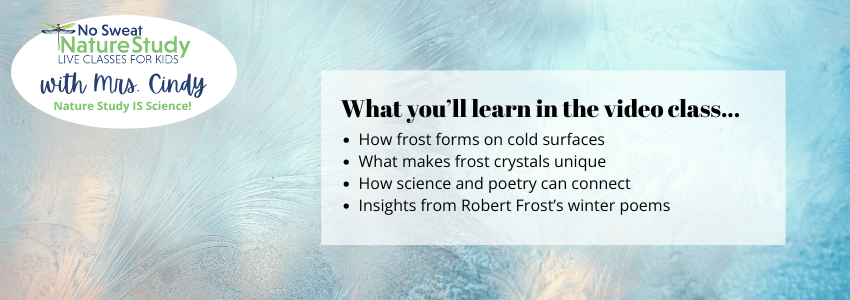Can Snow Make Sound Disappear?
Have you ever noticed how quiet the world gets after a snowfall? It’s not just your imagination, it’s science! In this No Sweat Nature Study Podcast episode, we’re investigating a chilly mystery: Can snow really make sound disappear? As we learn about sound waves, reflection, and absorption, young scientists will discover how freshly fallen snow plays a special role in muffling everyday noise. It’s a peaceful phenomenon that fits perfectly into a winter-themed frost nature study.
Along the way, listeners will explore how sound behaves in different environments, why winter naturally brings more stillness, and how snow’s unique structure helps absorb sound waves. With real-world examples and vivid imagery, this episode offers a quiet moment of wonder—perfect for listening with a cup of cocoa or during a snowy nature walk!
Snow and Frost Nature Study
After listening to the podcast together, use these questions to review for comprehension, reinforce science concepts, or prompt discussions.
- What are sound waves, and how do they travel? (Sound waves are invisible vibrations that travel through air, liquids, or solids.)
- Why does your voice echo in a gym or empty room? (Because hard surfaces reflect sound waves back to you, creating an echo.)
- What happens when sound waves hit something soft like snow? (The sound gets absorbed instead of bouncing back, making everything quieter.)
- Why is fresh snow especially good at absorbing sound? (Because it’s full of tiny ice crystals and air pockets that trap sound waves.)
- How does winter already make the world quieter, even without snow? (Many animals are hibernating, trees are bare, and insects are no longer buzzing.)
- Can you describe what it might feel like to walk through a snowy forest? (It might feel peaceful, muffled, and still.)
- What does it mean when we say snow “soaks up” sound like a sponge? (It means snow absorbs the sound instead of letting it bounce around.)
- How did the poem by Robert Frost connect to the science in this episode? (It described the quiet, lovely feeling of snowy woods, which ties into how snow absorbs sound.)
Frost Nature Study Video Class
The companion No Sweat Nature Study video class focuses on the fascinating science of frost. Children will learn how frost forms, what causes it to sparkle, and where it can be found on chilly mornings. Through clear teaching and engaging visuals, the lesson builds scientific understanding while encouraging careful observation of nature’s winter patterns.
Nature journaling becomes a creative experience as students draw and label frost formations. They’ll explore how temperature, moisture, and air interact to create these icy crystals. Then, we’ll enjoy Robert Frost’s poetry as an inspiring connection to the topic!

Buy Gift Cards for No Sweat Nature Study
‘Tis the season for gift-giving, and you can add No Sweat Nature Study to your wish list. Grandparents, aunts, uncles, and others can buy your family a gift card toward your quarterly or yearly subscription. Just send them to this link to purchase a gift card in time for Christmas.
Would you like to record a voicemail to answer this season’s nature study question?
At the end of each No Sweat Nature Study Podcast episode, Mrs. Cindy includes messages from a few of her friends. You can record a message that she might use on an upcoming episode!
All children must have their parents’ permission before leaving a recording. Parents are welcome to record an answer, too!
Each season, there will be a different question to answer. You can see this season’s question below. Think about your answer first, and then follow these simple directions:
- Click the “Start recording” button.
- Tell me your first name. (If you want to tell your age and/or where you live, feel free to do that.)
- You will have 60 seconds to answer the question, but try to be concise.
- Push the play button to listen to your recording before sending it, to ensure it is recorded correctly. If not, record it again.
Please leave a rating or a review on your podcast app! It helps the podcast to show up for more people…which means more families can enjoy science through the wonderful lens of nature study! Thank you!
